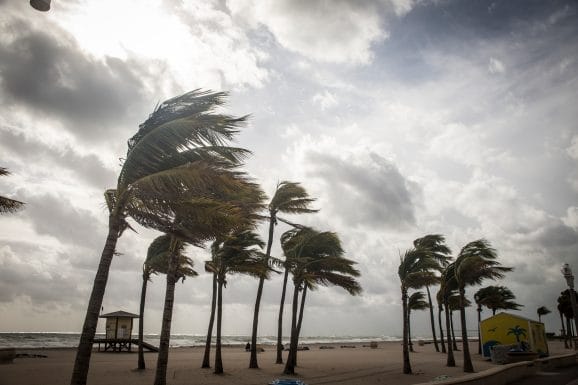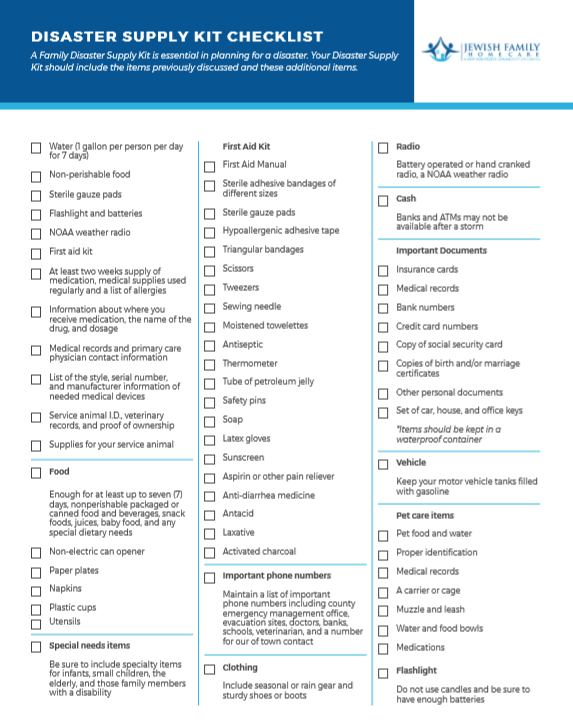Hurricane watches and warnings are fairly common in South Florida during the Atlantic Basin (Atlantic Ocean, Caribbean Sea, and the Gulf of Mexico) hurricane season which lasts from June 1st to November 30th. As a result, hurricane preparedness is a way of life for everyone living in the region, and for seniors living at home, it is even more important.
Older adults are often slower and less mobile, which makes preparation and response more difficult. But if you are a senior or the caregiver of an older family member, there are many steps you can take to prepare for a potential hurricane. Let’s explore hurricane preparedness for seniors who enjoy the independence of living at home in South Florida.
Be Prepared

The best advice for everyone living in South Florida is simple – be prepared. For seniors, planning is essential and often results in additional special circumstances that need to be a part of the overall preparation.
Having a plan gives everyone involved peace of mind in the event a hurricane strikes – which can mean loss of power and water for long periods as well as possible evacuation. Since hurricane season is essentially half the year, plans and preparation should be in place before hurricane season begins.
Step 1 – The Hurricane Preparedness Kit
The hurricane preparedness kit includes essential supplies should power and water be unavailable for an extended period. Prepare your kit with supplies for a minimum of five days. You should include:
- Flashlights with extra batteries
- Manual can opener
- Toiletries
- First aid kit
- Medications
- A gallon of water per day per person
- Non-perishable food and juices
In addition to this kit, you’ll want a kit prepped just in case an evacuation is required. Your evacuation kit should include:
- Emergency contact information (family and friends)
- Identification
- Cash and coins
- House and car keys
- Make copies of important documents (birth certificate, deeds, insurance papers, etc.)
- Store your items safely in an airtight plastic bag for protection
Step 2 – The Hurricane Preparedness Plan
Your plan should begin with a network of friends, loved ones, and neighbors who you can call on if a hurricane hits your area. Keep phone numbers near your telephone. Create a contingency plan in case help can’t be reached, which includes local phone numbers for FEMA (the Federal Emergency Management Agency), the American Red Cross, and local disaster relief agencies.
In the event of an evacuation, choose a place to stay out of the area with friends or relatives, at a hotel, or a medical facility if health issues are a concern. Consider purchasing an evacuation or escape chair if mobility is an issue. Make note of specialty items you might need, such as oxygen, wheelchair batteries, extra eyeglasses, food for pets or service animals, etc.
Step 3 – Practice Your Plan (Including Worst Case Scenarios)
Know where the public emergency shelters, including special needs shelters, are in your community. Be aware of the rules of shelters, which don’t allow pets (only service animals) and require caregivers to stay with those for whom they are caring for. If medical concerns are an issue, talk to your physician regarding pre-admission to a skilled facility in case of evacuation. If an evacuation occurs, test run your plan.
How Can the Elderly Prepare for Hurricane Season Amid COVID19?
According to the Centers for Disease Control and Prevention (CDC), there are a few things you and your loved one should consider when preparing for hurricane season during the COVID-19 pandemic:
- Planning will be a little different this year because you will need to take extra precautions to protect you and your loved one from COVID-19. Where will your older parent stay during the hurricane? Do they need to stock up on any medications? These are things you should consider and start planning for before a hurricane or tropical storm visits Florida.
- Plan ahead of time and consider home delivery or curbside pickup services for buying disaster supplies. If you are going to be doing in-person shopping, please follow the safety prevention tips listed in this helpful blog.
- Limit in-person visits to the pharmacy. Use drive-through, curbside pickup, or sign up for mail order delivery, if available, to pick up you or your loved one’s prescription. At Jewish Family Home Care, our reliable and compassionate Certified Nursing Assistants and Home Health Aides also run medication errands and will make sure your loved one takes the right medications at the right times.
For more information, please visit:
Should an Advisory Be Issued
If an advisory is issued for your area, charge your phones, gas up your vehicle, and get ready – just in case. If you need transportation assistance, schedule it as soon as the advisory is issued. Get your kits ready and secure the loose items outside your home. Stay aware of the situation, monitoring news outlets for the latest updates. If you must evacuate, let loved ones know where you are headed, turn off water, electricity, and propane before leaving home.
Contact Jewish Family Home Care
In times of a hurricane, the Jewish Family Home Care team tries their best to be in full preparation mode and will work to ensure all our clients receive the best service possible. We want to assure you peace of mind during these times of uncertainty by providing compassionate, friendly, trusting, and reliable care to your loved one.
If you or your loved one need assistance during hurricane season, please contact Jewish Family Home Care, the top provider of Sunrise in-home care and care throughout the surrounding areas.
For your convenience, Jewish Family Home Care has provided your family with a Disaster Supply Kit checklist below:
